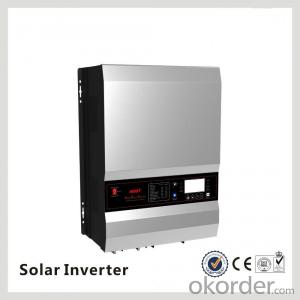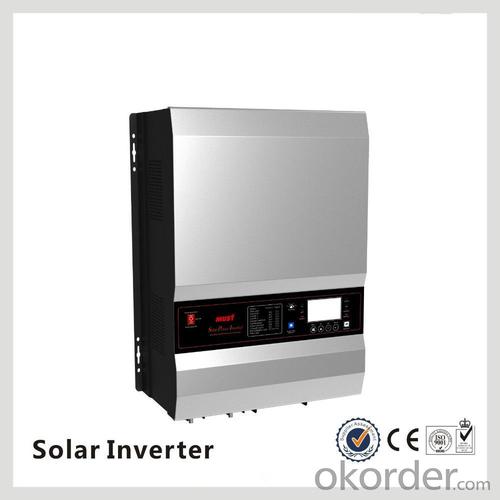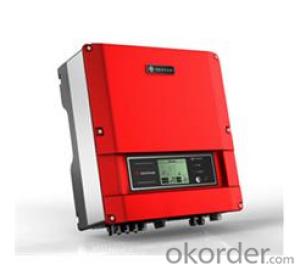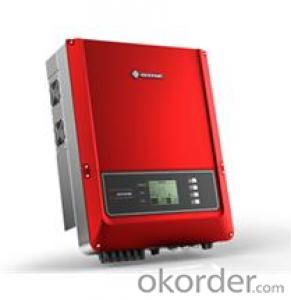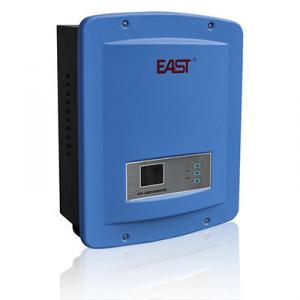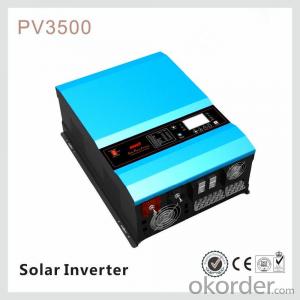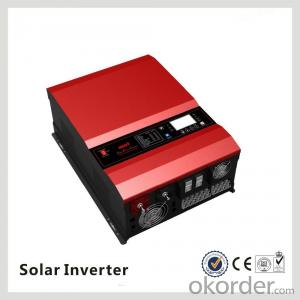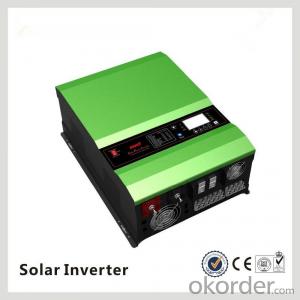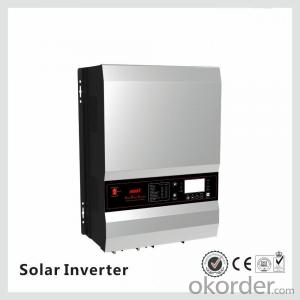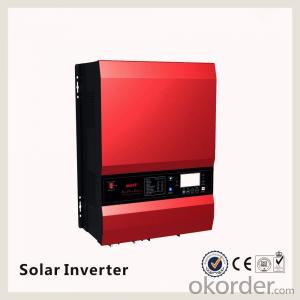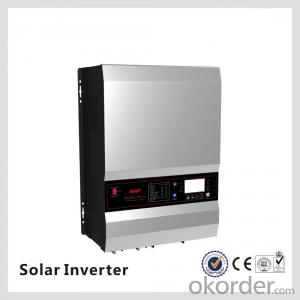Ginlong Solar Inverter PV35-8K Low Frequency DC to AC Solar Power Inverter 12KW
- Loading Port:
- Shanghai
- Payment Terms:
- TT OR LC
- Min Order Qty:
- 1000 watt
- Supply Capability:
- 100000 watt/month
OKorder Service Pledge
OKorder Financial Service
You Might Also Like
Product Description
What is Solar inverter?
Solar pv inverters is an electronic system that operates the photovoltaic(PV) modules in a manner that allows the modules to produce all the power they are capable of. The solar mate charge controller is a microprocessor-based system designed to implement the MPPT. It can increase charge current up to 30% or more compared to traditional charge controllers.
Features
· Power range 1KW - 12KW
· Inbuilt pure copper transformer
· Powerful charge rate up to 100Amp
· MPPT solar charge controller 45A 60A (120A Option)
· PV input:145V max
· 12V/24V/36V/48V auto work
· MPPT efficiency>99% , Peak conversion efficiency>98%
· DSP processors architecture ensure high speed and performance
· Four-stages charging mode
· Protection: PV array short circuit, PV reverse polarity, Battery reverse polarity, Over charging, Output short circuit
· High efficency design & "Power Saving Mode" to coverse energy
Specification
MODEL | PV35-1K | PV35-2K | PV35-3K | PV35-4K | |||||||||||||||
Default Battery System Voltage | 12VDC | 24VDC | 12VDC | 24VDC | 12VDC | 24VDC | 12VDC | 24VDC | |||||||||||
INVERTER OUTPUT | Rated Power | 1KW | 2KW | 3000VA/2.4KW | 4000VA/3.2KW | ||||||||||||||
Surge Rating (20ms) | 3KW | 6KW | 9KW | 12KW | |||||||||||||||
Capable Of Starting Electric Motor | 1HP | 1HP | 1.5HP | 2HP | |||||||||||||||
Waveform | Pure sine wave/ same as input (bypass mode) | ||||||||||||||||||
Nominal Output Voltage RMS | 100V/110V/120VAC 220V/230V/240VAC(+/-10% RMS) | ||||||||||||||||||
Output Frequency | 50Hz/60Hz +/-0.3 Hz | ||||||||||||||||||
Inverter Efficiency(Peak) | >88% | ||||||||||||||||||
Line Mode Efficiency | >95% | ||||||||||||||||||
Power Factor | 0.8 | ||||||||||||||||||
Typical Transfer Time | 10ms(max) | ||||||||||||||||||
AC INPUT | Voltage | 230VAC | |||||||||||||||||
Selectable Voltage Range | 96~132VAC/155~280VAC(For Personal Computers) | ||||||||||||||||||
Frequency Range | 50Hz/60Hz (Auto sensing) 40-80Hz | ||||||||||||||||||
BATTERY | Minimum Start Voltage | 10.0VDC /10.5VDC for12VDC mode (*2 for 24VDC, *4 for 48VDC) | |||||||||||||||||
Low Battery Alarm | 10.5VDC+/-0.3V for12VDC mode (*2 for 24VDC, *4 for 48VDC) | ||||||||||||||||||
Low Battery Cutoff | 10.0VDC+/-0.3V for12VDC mode (*2 for 24VDC, *4 for 48VDC) | ||||||||||||||||||
High Voltage Alarm | 16.0VDC+/-0.3V for12VDC mode (*2 for 24VDC, *4 for 48VDC) | ||||||||||||||||||
High Battery Voltage Recover | 15.5VDC+/-0.3V for12VDC mode (*2 for 24VDC, *4 for 48VDC) | ||||||||||||||||||
Idle Consumption-Search Mode | <25W when power saver on | ||||||||||||||||||
CHARGER | Output Voltage | Depends on battery type | |||||||||||||||||
Charger AC Input Breaker Rating | 10A | 30A | 30A | 30A | |||||||||||||||
Overcharge Protection S.D. | 15.7VDC for 12VDC mode (*2 for 24VDC, *4 for 48VDC) | ||||||||||||||||||
Maximum Charge Current | 45A | 25A | 70A 35A | 90A 50A | 65A 40A | ||||||||||||||
BTS | Continuous Output Power | Yes Variances in charging voltage & S.D. voltage base on the battery temperature | |||||||||||||||||
BYPASS & PROTECTION | Input Voltage Waveform | Sine wave (grid or generator) | |||||||||||||||||
Nominal Input Frequency | 50Hz or 60Hz | ||||||||||||||||||
Overload Protection (SMPS Load) | Circuit breaker | ||||||||||||||||||
Output Short Circuit Protection | Circuit breaker | ||||||||||||||||||
Bypass Breaker Rating | 10A | 15A | 20A | 40A | |||||||||||||||
Max Bypass Current | 30Amp | ||||||||||||||||||
SOLAR CHARGER | Maximum PV Charge Current | 45A | |||||||||||||||||
DC Voltage | 12V/24V atuo work | ||||||||||||||||||
Maximum PV Array Power | 600W | 1200W | 600W | 1200W | 600W | 1200W | 600W | 3200W | |||||||||||
MPPT Range @ Operating Voltage(VDC) | 16-100VDC for 12V mode,32-100V for 24V mode | ||||||||||||||||||
Maximum PV Array Open Circuit Voltage | 100VDC | 147VDC | |||||||||||||||||
Maximum Efficiency | >98% | ||||||||||||||||||
Standby Power Consumption | <2w< span=""> | ||||||||||||||||||
MECHANICAL SPECIFICATIONS | Mounting | Wall mount | |||||||||||||||||
Dimensions (W*H*D) | 493*311*215mm | ||||||||||||||||||
Net Weight (Solar CHG) kg | 23.5 | 24.5 | 25.5 | 29.5 | |||||||||||||||
Shipping Dimensions(W*H*D) | 580*400*325mm | ||||||||||||||||||
Shipping Weight (Solar CHG) kg | 25.5 | 26.5 | 27.5 | 31.5 | |||||||||||||||
OTHER | Operation Temperature Range | 0°C to 40°C | |||||||||||||||||
Storage Temperature | -15°C to 60°C | ||||||||||||||||||
Audible Noise | 60dB MAX | ||||||||||||||||||
Display | LED+LCD | ||||||||||||||||||
Loading(20GP/40GP/40HQ) | 150pcs/300pcs/350pcs | ||||||||||||||||||
Images
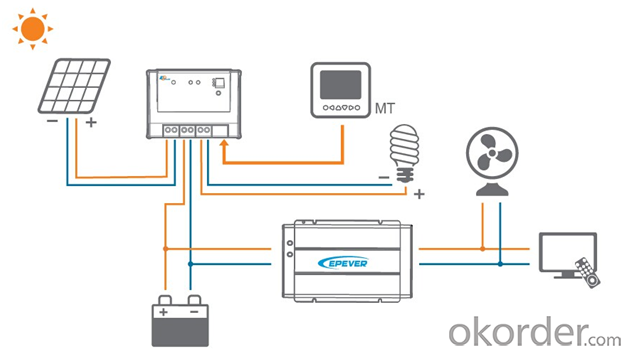
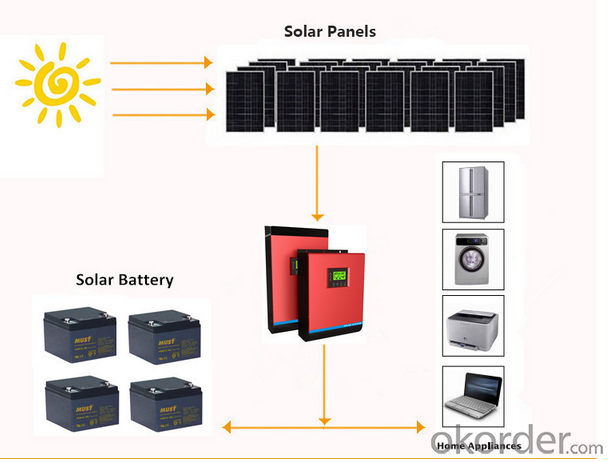
Packaging & Shipping
What is the packing?
1.Package: Carton Box for packaging, or Wooden Box advised for Samples to protect in transportations. Package designed by Clients is welcomed.
2.Shipping: DHL,FEDEX,UPS,EMS,AirWay and By Sea.
3.Payment: T/T( telegraphic transfer (T/T) and Western Union
4.Welcome to your Sample Order to test First.
FAQ
Q1: How to choose a right inverter?
A1:Tell us your demand, then our sales will recommend a suitable inverter to you.
Q2: What's the different between inverter and solar inverter?
A2: Inverter is only accept AC input, but solar inverter not only accept AC input but also can connect with solar panel to accept PV input, it more save power.
Q3: How about the delivery time?
A3: 7 days for sample; 25 days for bulk order.
- Q: Can a solar inverter be used with a solar car charging system?
- Yes, a solar inverter can be used with a solar car charging system. A solar inverter converts the direct current (DC) produced by solar panels into alternating current (AC) that can be used to charge electric vehicles, including solar cars. This allows the solar car charging system to efficiently convert and deliver the solar energy to charge the car's battery.
- Q: Can a solar inverter be used with a string inverter system?
- No, a solar inverter cannot be directly used with a string inverter system. A solar inverter converts the direct current (DC) generated by the solar panels into usable alternating current (AC) electricity. On the other hand, a string inverter manages the output of multiple solar panels connected in series, converting the DC power from the panels to AC power for the grid. These two types of inverters serve different functions and are not compatible with each other.
- Q: How efficient are solar inverters?
- Solar inverters are highly efficient, typically converting around 95% to 98% of the direct current (DC) power generated by solar panels into usable alternating current (AC) electricity.
- Q: How is the output voltage of a solar inverter regulated?
- The output voltage of a solar inverter is regulated through the use of advanced control mechanisms and power electronics. These components monitor the input voltage from the solar panels and adjust the inverter's internal circuitry accordingly to ensure a stable and consistent output voltage. This regulation process involves techniques such as pulse width modulation (PWM) and maximum power point tracking (MPPT) to optimize the power conversion and maintain the desired voltage level.
- Q: Can a solar inverter be used with dual MPPT inputs?
- Yes, a solar inverter can be used with dual MPPT inputs. Dual MPPT (Maximum Power Point Tracking) inputs allow the inverter to optimize the power output from two separate solar arrays or strings, thereby increasing overall energy efficiency and system performance.
- Q: What is the maximum input voltage for a solar inverter?
- The maximum input voltage for a solar inverter depends on the specific model and manufacturer. It can vary, but generally, solar inverters can handle input voltages ranging from 300 to 1000 volts.
- Q: How does a solar inverter handle variations in solar panel tilt and orientation?
- A solar inverter handles variations in solar panel tilt and orientation by adjusting the power output to maximize the energy harvest. It continuously monitors the performance of the solar panels and adjusts the voltage and current levels to optimize the conversion of sunlight into usable electricity. This allows the inverter to accommodate changes in tilt and orientation, ensuring the system operates at its highest efficiency regardless of the panel position.
- Q: What is the role of a solar inverter in a solar panel system?
- The role of a solar inverter in a solar panel system is to convert the direct current (DC) generated by the solar panels into alternating current (AC) that can be used to power household appliances and be fed into the electrical grid. It also ensures maximum power output and efficiency from the solar panels by constantly tracking the maximum power point.
- Q: How does a solar inverter handle voltage unbalance?
- A solar inverter handles voltage unbalance by continuously monitoring the grid voltage levels and adjusting its output accordingly. If it detects any voltage imbalance, it dynamically regulates the output voltage to balance the system. This ensures that the inverter operates within the acceptable voltage limits, prevents damage to the connected devices, and maintains efficient energy conversion.
- Q: Can a solar inverter be used in extreme weather conditions?
- Yes, solar inverters are designed to withstand extreme weather conditions. They are built to be durable and resistant to factors such as temperature fluctuations, humidity, and harsh weather elements. However, it is always recommended to consult the manufacturer's guidelines to ensure proper installation and protection measures are in place for specific weather conditions.
Send your message to us
Ginlong Solar Inverter PV35-8K Low Frequency DC to AC Solar Power Inverter 12KW
- Loading Port:
- Shanghai
- Payment Terms:
- TT OR LC
- Min Order Qty:
- 1000 watt
- Supply Capability:
- 100000 watt/month
OKorder Service Pledge
OKorder Financial Service
Similar products
Hot products
Hot Searches
Related keywords
